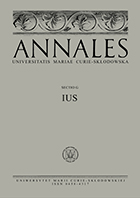Kierunki zmian tożsamości polskiego prawa urzędniczego
Directions of Changes in the Identity of the Polish Civil Service
Author(s): Wojciech DrobnySubject(s): Public Administration, Labor relations
Published by: Wydawnictwo Naukowe Uniwersytetu Marii Curie-Sklodowskiej
Keywords: civil service; public administration; labor law;
Summary/Abstract: The creation of professional civil service, operating on the foundation of axiological objectives of the democratic state is a complex and long-drawn-out process. Polish experiences in this respect are not minute as the origins of the civil service date back as far as the interwar period. Whereas the first civil service practice was established in 1996 and included the regulations clearly inspired by the Polish experience of the interwar period as well as Western-European solutions in this respect. The legislator was in favour of the career system, setting up the service of the public interest. The legislator defined the major aim of the institution establishment as well, whose main objective was to assure in the government administration offices professional, reliable, impartial, politically-neutral execution of the state tasks. Two years later, the bill was replaced with another practice. In the light of the 1998 Bill, the concept of the institution was adopted. The legislator proposed a mixed model of civil service, which means that the model comprised elements of career and positions model with the prevailing role of the latter. Another Bill on Civil Service from 2006, in the assessment of the doctrine, ruined former achievements of the Polish legislation in the area of civil service. The civil service corps, existing under the rule of the Bill, was stripped of managerial positions. The developed system of civil service organization was liquidated by abolishing the position of the Head of Civil Service and their office. Therefore, in 2008 the legal act was aptly rescinded, replacing it with the bill particularly restoring the position of the Head of Civil Service as well as higher positions in the civil service itself. Nevertheless, that legal act also includes major flaws disqualifying itself from positive assessment. Thus, in the period of less than twenty years, the subject matter in question has been regulated by four completely different legal acts which violates the foundations of a law governed state and definiteness of law. Such changes, with every subsequent entry of a new practice, had a negative effect on practical functioning of the Civil Service Corps and, at the same time, the realization of state tasks.
Journal: Annales Universitatis Mariae Curie-Skłodowska, sectio G – Ius
- Issue Year: 64/2017
- Issue No: 2
- Page Range: 71-82
- Page Count: 12
- Language: Polish

